

The Impact Of The Coronavirus On HR And The New Normal Of Work. For the past decade I have been writing and speaking about the disruptions in the way we work, learn and communicate.
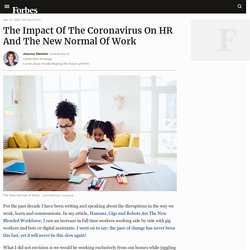
The Psychology Of Uncertainty: How To Cope With COVID-19 Anxiety. If you follow social media for any length of time, you might feel like going to bed and pulling the covers over your head.
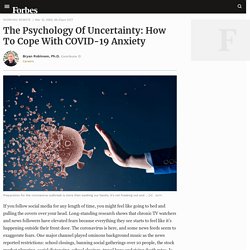
Long-standing research shows that chronic TV watchers and news followers have elevated fears because everything they see starts to feel like it’s happening outside their front door. The coronavirus is here, and some news feeds seem to exaggerate fears. One major channel played ominous background music as the news reported restrictions: school closings, banning social gatherings over 10 people, the stock market plunging, social distancing, school closings, travel bans and rising death rates. Is your heart slamming against your rib cage yet? Dr. Fauci predicts life in US might not be back to normal until late 2021. For the most up-to-date news and information about the coronavirus pandemic, visit the WHO website.
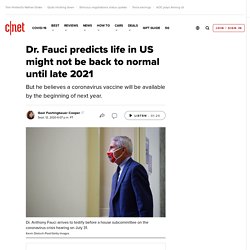
Longing to get back to pre-pandemic life, with its in-theater movies and other group activities? It may take awhile. Dr. Anthony Fauci, director of the National Institute of Allergy and Infectious Diseases, told told MSNBC's Andrea Mitchell Friday that while he hopes a coronavirus vaccine is in the near future, American life will stay shaken up until "well into 2021. " Second wave of coronavirus could bring higher peak in fall: chart - Business Insider. Back to normal: Why we must accept it won't happen. It has become a well-worn phrase our politicians, officials, experts, even family, like to lean on — an ultimate, elusive prize.

Perhaps it's nostalgia for the world of January, a place where daily life more closely resembled our past decades. Perhaps it's a bid to show control, to revert to a time when change was not so universally imposed upon us. But January is long gone, and it's not coming back. And, psychologists will tell you, that's only bad if you can't come to terms with it. We are slowly learning if this year's changes are permanent. "Five years' change in six months" is a common slogan for the pandemic. Yet permanently severing ties with January is not necessarily a bad thing, psychologists say. "Politicians who pretend that 'normal' is just around the corner are fooling themselves or their followers, or perhaps both," said Thomas Davenport, the president's distinguished professor of information technology and management at Babson College in Wellesley, Massachusetts. Here’s How the Pandemic Finally Ends. Many experts, including the director of the CDC, predict that vaccines could be widely available as early as late spring or summer.

But Emanuel believes that they’re underestimating just how difficult it will be to manufacture and distribute the doses at scale. In a report published by the Center for American Progress this summer, he and co-author Topher Spiro pointed out large gaps in the country’s vaccine setup, including potential shortages of production capacity, syringes and packaging. 5 Things to Know About a COVID Vaccine: It Won’t Be a ‘Magic Wand’ President Donald Trump makes no secret he would like a COVID-19 vaccine to be available before the election.

But it’s doubtful that will happen and, even after a vaccine wins FDA approval, there would be a long wait before it’s time to declare victory over the virus. Dozens of vaccine candidates are in various testing stages around the world, with 11 in the last stage of preapproval clinical trials — including four in the U.S. One or more may prove safe and effective and enter the market in the coming months. What then? Here are five things to consider in making vaccine dreams come true. 1. Eight Persistent COVID-19 Myths and Why People Believe Them. ○ 1 The virus was engineered in a laboratory in China.
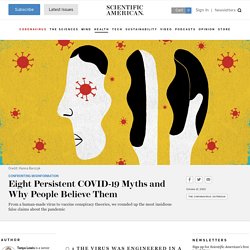
Because the pathogen first emerged in Wuhan, China, President Donald Trump and others have claimed, without evidence, that it started in a lab there, and some conspiracy theorists believe it was engineered as a bioweapon. Why It’s False: U.S. intelligence agencies have categorically denied the possibility that the virus was engineered in a lab, stating that “the Intelligence Community ... concurs with the wide scientific consensus that the COVID-19 virus was not man-made or genetically modified.”
10 new COVID-19 myths: Expert opinion. In this Special Feature, we asked our resident experts to chip away at some of the latest rumors, myths, and half-truths that surround the ongoing COVID-19 pandemic.
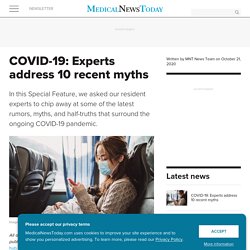
All data and statistics are based on publicly available data at the time of publication. Some information may be out of date. Visit our coronavirus hub and follow our live updates page for the most recent information on the COVID-19 pandemic. Houston Is Using The Pandemic As An Opportunity To Build A Resilient Smart City. Houston, Texas, with 2.3 million residents, is one of the most diverse cities in America.
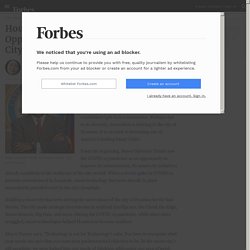
In the last few decades, Hispanic and Asian immigrants thrived in this metropolis while African Americans established tight-knit communities. Perhaps due to its diversity, innovation is thriving in the city of Houston. It is on track to becoming one of America’s leading Smart Cities. From the beginning, Mayor Sylvester Turner saw the COVID-19 pandemic as an opportunity to improve its infrastructure. Its smart city initiatives already contribute to the resilience of the city overall. Building a smart city has been driving the innovations of the city of Houston for the last decade. Mayor Turner says, "Technology is not for Technology's sake. Managing mental health during COVID-19.
Updated June 5, 2020 During a crisis such as the COVID-19 pandemic, it is common for everyone to experience increased levels of distress and anxiety, particularly as a result of social isolation.
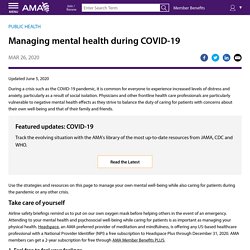
Physicians and other frontline health care professionals are particularly vulnerable to negative mental health effects as they strive to balance the duty of caring for patients with concerns about their own well-being and that of their family and friends. Use the strategies and resources on this page to manage your own mental well-being while also caring for patients during the pandemic or any other crisis. 5 Actions We Each Need to Take to Fight COVID-19. Leading Through COVID-19: 4 Strategies to Inspire and Motivate. This is part four of our multi-part blog and video series, Leading Teams in Times of Crisis and Immense Change. During these challenging times, staff are experiencing high levels of change, resulting in increased levels of stress and anxiety. Staff are at their best when they feel their leader is invested in them both personally and professionally, so in these times of high stress and anxiety, it is essential for leaders to support employees in every way possible on a regular basis.
Providing this support is always important, but in this difficult time, it is especially critical to your success and the well-being of your organization. Here are four steps you can take to inspire and motivate staff during these times: 1. One of the most important actions a leader can take is to invest in listening to their employees. The hidden Covid-19 crisis: health care workers' mental health. In the midst of this global pandemic, people are talking about the urgent and critical need for personal protective equipment.
They are sharing concerns about the impending lack of respirators and the need for testing. And they are encouraging people to #flattenthecurve through social distancing. But no one is talking about a potential mental health crisis facing health care workers on the frontlines of this pandemic. To an outside observer, health care workers look strong and resilient in the face of the unknown. They inspire us as they go to work every day, at great personal risk, to keep others safe. But, as a psychiatrist, I spend much of my life observing and listening — I know that their calm surface appearance is the only armor they have left. Creating a resilient organization for health care workers during a crisis. Updated May 8, 2020 Action steps taken by an organization before, during and after a crisis will reduce psychosocial trauma and increase the likelihood your workforce will cope or even thrive.
How physicians and other health care workers are supported during a time of acute stress impacts how they cope and whether they recover from the crisis, or alternatively, whether they will adopt unhealthy coping mechanisms and show signs of stress injury (burnout, insomnia, dysphoria) or even worse, chronic stress illness (depression, anxiety, PTSD, substance abuse). Effectively caring for the health care worker may decrease their risk of leaving practice or limiting their full-time effort. Successful organizations will take a systems approach and focus on becoming a resilient organization prior to times of crises, rather than limiting their efforts to a focus on individual resilience or only attending to the well-being of health care workers after crises develops. 1. 2. 3. 4. Caring for health care workers covid 19.
Caring for our caregivers during COVID-19. Updated June 5, 2020 Resources for health care leadership Amid the COVID-19 global outbreak, it's likely to be a stressful time for those who work on the front lines of health care. Now more than ever, it's important for health systems and health care organizations to create and ensure an infrastructure and resources to support physicians, nurses and care team members.
The following lists provide practical strategies for health system leadership to consider in support of their physicians and care teams during COVID-19. Note that any activities involving medical students or other health professions students should be part of a voluntary, student-led program overseen by their school in compliance with guidance from the LCME or other accreditor. Some items in the list are suggestions, while others have already been implemented by health systems. Assess physician stress and identify specific drivers Building a resilient organization. Share Your Message of Support.
As our clinicians and staff continue to selflessly work around the clock to provide care to our patients, we have been overwhelmed by the support from family and friends, neighbors and strangers, local businesses and organizations, schools, churchs and supporters from all walks of life who see Emerson as a vital member of the community. Your donations of personal protective equipment, supplies, meals and more are a daily reminder of the generosity inherent in this community. Your messages of support and gratitude have, now more than ever, been especially motivating. If you'd like to share a story of compassionate care or just express your appreciation, please feel free to fill out the form below.
To support health care workers battling COVID-19, start fresh and think holistically, experts say. What Healthcare Workers Need From Leaders in COVID-19 Crisis. Story Highlights Data show healthcare workers need more support from leadershipFocus on transparent communication, innovation and wellbeingLeaders can facilitate their employees' success. Viewpoint: 12 Tips for Return-to-Work Communications. (22) COVID-19 and the Vital Role of Organization Development. Struggling to keep staff up-to-date? Use these 5 e-communication channels. Culture: Making the Case for Change. Inspirational quotes to get us through the coronavirus shutdown. Special Report: The COVID-19 Fallout. Bite-Size Series. Graphic Medicine. Last updated 05/08/20. Inspirational quotes to get us through the coronavirus shutdown.
Healthcare Providers: Preparing for the next normal after COVID-19. As healthcare providers face the humanitarian tragedy of the COVID-19 pandemic, they also face unprecedented stress (individually and institutionally) around the world. The immediate response to the crisis is causing seismic shifts in how and where care is provided. From surviving to thriving: Business after coronavirus. The 1966 World Cup marked a low point for Brazilian soccer. Although the winner of the previous two tournaments, the team was eliminated in the first round, and its star player, Pelé, failed to perform. The tech needed for more contactless hospitals, healthcare. A Look at the Frontlines – OutSmart Magazine. Acting with empathy during COVID-19. Workplace bullying on the rise due to coronavirus fears. Your Employee Tested Positive for Covid-19. What Do You Do? 6 tips to respond to employee anxiety about COVID-19 - CMHA National.
How Managers Can Plan For Employees’ Successful Return to Federal Offices - Government Executive. Feeling More Tired Than Usual During Lockdown? Psychologists Explain Why. Coronavirus: These Inspiring Phrases Can Keep Us Positive. Six Tips for Working Remotely. COVID-19 Will Fuel the Next Wave of Innovation.